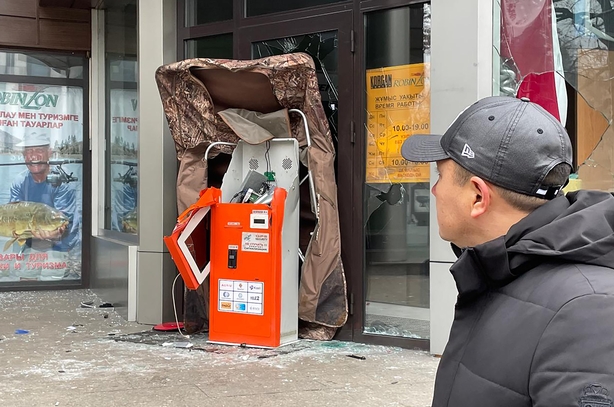Days of unrest in Kazakhstan have left dozens dead and public buildings ransacked and torched in the worst violence in its 30 years of independence. President Kassym-Jomart Tokayev has rejected calls for talks with protesters, vowing to destroy "armed bandits" and authorising his forces to shoot to kill without warning. But what is behind this current turmoil in the world's largest landlocked country?
Where exactly is Kazakhstan?
Long seen as one of the most stable of the ex-Soviet republics of Central Asia, energy-rich Kazakhstan is facing one of its biggest crises in decades.
Located between Russia and China, Kazakhstan also shares borders with three other ex-Soviet republics – Uzbekistan, Kyrgyzstan and Turkmenistan.
Strategically it links the large and fast-growing markets of China and South Asia with those of Russia and Europe by road, rail and a port on the Caspian Sea.
What has sparked the protests?
Demonstrations that began as a response to a New Year’s Day fuel price hike have swelled into a broad movement against the government and ex-leader Nursultan Nazarbayev, 81, the longest-serving ruler of any former Soviet state.
Nazarbayev turned over the presidency to Mr Tokayev, 68, three years ago but his family is widely believed to have retained influence in Nur-Sultan, the purpose-built capital that bears his name.
The protesters in Almaty appear mainly to come from the city’s poor outskirts or surrounding towns and villages. Widespread unrest has been reported in a number of other cities across the vast country of 19 million people.
President Tokayev said foreign-trained terrorists were responsible for the unrest.

What has been the response of the government?
Security forces appeared to have reclaimed the streets of Almaty after days of violence, as the Russian-backed president said he had ordered his troops to shoot to kill to end the countrywide uprising.
The interior ministry said 26 "armed criminals" had been "liquidated" and more than 3,800 detained, while 18 police and national guard service members had been killed since the start of the protests.
Security forces appear to be in control of Almaty as the president said constitutional order had mostly been restored. Strategic parts of the city have been blocked off, with troops firing into the air if anyone approached, an AFP correspondent said.
Who are the main players?
In a hard-line address to the nation, Mr Tokayev gave "special thanks" to Russian President Vladimir Putin after a Moscow-led military alliance sent paratroopers to help quell the unrest.
Moscow’s swift deployment demonstrated Putin’s readiness to use force to maintain influence in the former Soviet Union.
The mission falls under the umbrella of the Collective Security Treaty Organization, comprising Russia and five ex-Soviet allies.
White House spokeswoman Jen Psaki said Washington was watching Russia’s troops for any "actions that may lay the predicate for the seizure of Kazakh institutions".

